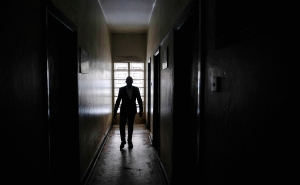The Other Time a U.S. President Withheld WHO Funds

President Trump’s decision last week to suspend payments to the WHO wasn’t the first time a U.S. president has withheld funds and criticized the organization early in a historic pandemic.
President Reagan did it in the 1980s as HIV/AIDS began to emerge as a global killer. And D.A. Henderson, then dean of what would become Johns Hopkins Bloomberg School of Public Health, advocated fiercely for the WHO.
After Reagan took office in 1981, his administration assailed the UN and its agencies as an unaccountable, bloated bureaucracy. As Marcos Cueto’s new history of the WHO explains, U.S. conservatives suspected that the WHO was working against free enterprise and American interests, particularly after the 1978 WHO Alma-Ata Declaration in support of universal primary health care.
Congress voted several times to postpone an $86 million payment so that by the end of 1987, for the first time since the creation of the WHO in 1948, the U.S. had failed to send all of its promised payments for over a year.
Awarded the 1986 National Medal of Science by Reagan for his work leading the WHO smallpox eradication campaign, Henderson soon launched a public crusade to reverse the Reagan administration’s decision to default on WHO payments, which had passed unnoticed in the news media.
As 1987 began, Henderson wrote to a who’s-who list of political and health luminaries including the heads of WHO, NIH, CDC, and FDA as well as powerful U.S. senators and representatives, according to never-before-released documents from Henderson’s papers.
In a Baltimore Sun editorial, Henderson warned that the U.S. default was already influencing other countries to do the same and causing foreign allies to question America’s “long-recognized traditions of humanity and moral leadership.” By breaking its treaty obligations to WHO and other UN agencies, Henderson said, the U.S. was risking “the charge of being morally bankrupt.”
By late March, Henderson wrote to WHO Director-General Halfdan Mahler that “my troops continue to remain optimistic as indeed we have succeeded in obtaining White House support.” Every living U.S. Surgeon General had signed a letter to members of Congress and the executive branch. Coverage in the Washington Post, New York Times, and other outlets intensified with articles and op-eds by Henderson and other medical and scientific experts.
In mid-1987, as top world leaders attended the first special session on AIDS at the G7 summit, WHO faced its worst budget crisis to date, largely because of the withheld U.S. payments. Henderson noted in the Washington Post, America’s “embarrassing and awkward” position because the U.S. was both the epicenter of the AIDS epidemic and the only country in default to WHO. Calling AIDS “the most serious global epidemic of recent centuries,” he implored the president and Congress not to “cripple, perhaps destroy the one organization which can contain this foe.”
The payments remained on hold for another 18 months.
In September 1988, as Reagan prepared his final address to the UN, he was warned that he might be booed if the U.S. had still not released the funds when he spoke. At the 11th hour, he relented and ordered the release of the backlog of UN commitments. In return, the UN agreed to a 15% staff cut and a much smaller austerity budget.
The Reagan administration’s halting response to the AIDS epidemic has long been criticized. In 1987, Henderson already recognized the need to “flatten the curve” of HIV infection and advocated for the U.S. and other donor countries to spend $2 billion or more on AIDS control efforts, doubling the amount for health programs within international development expenditures at the time.
This goal would not be met until the early 2000s with the inception of the President's Emergency Plan for AIDS Relief (PEPFAR) under President George W. Bush.
Karen Kruse Thomas, PhD, is the Bloomberg School historian.




